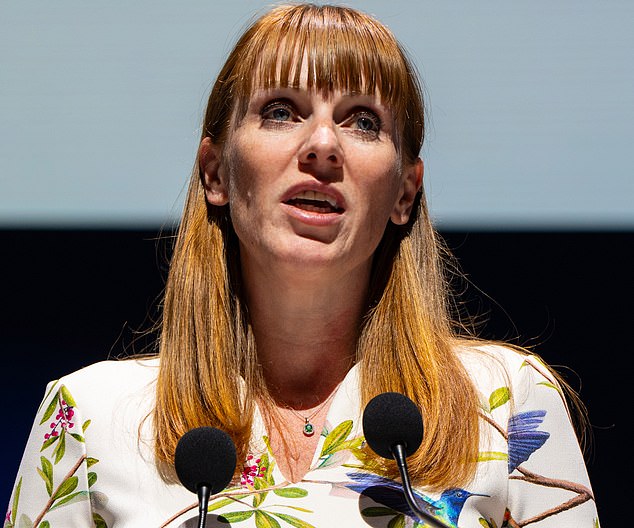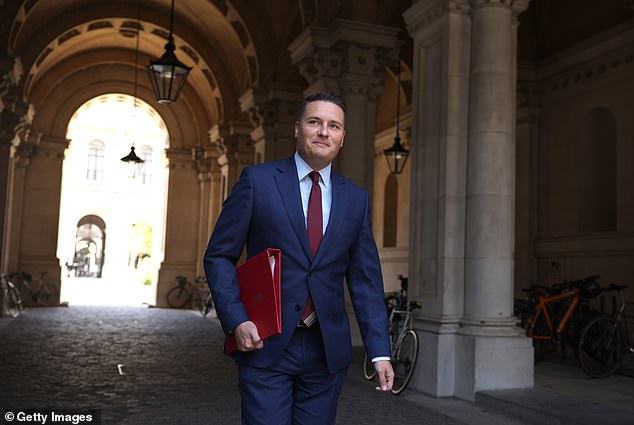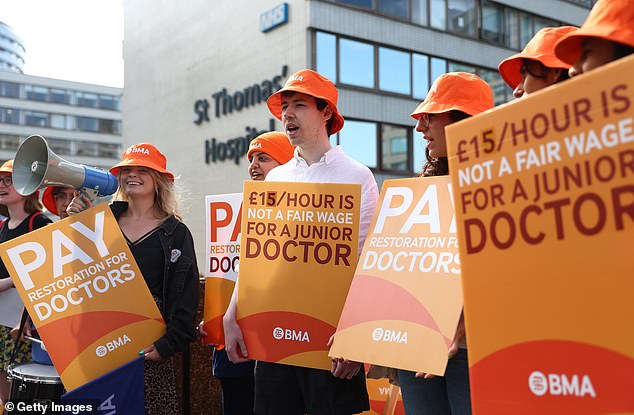When in opposition, Labour made a series of contradictory promises. The party would pay public sector workers more and make it easier for unions to call strikes. Yet it would also make sure that there was enough economic growth to cover these rises.
Now it is discovering how incompatible those promises are. Ministers are furious with junior doctors – now called resident doctors – for calling more strikes only a year after getting a huge pay rise.
Yet, at the same time, Deputy Prime Minister Angela Rayner is scrapping the minimum turnout that a trade union needs before launching legal strike action – a threshold that the doctors barely cleared in their recent ballot.
Under the current rules, a strike requires the approval of 50 per cent of eligible union members. The BMA strike got 55 per cent which, as the Health Secretary Wes Streeting points out, is hardly a massive mandate. Yet his Government is lifting the requirement altogether.
You can hardly blame the union for pushing at a door that ministers are theatrically unbolting. We are in for strikes of the most disruptive kind.
The Corbynite clique that runs the BMA is being bellicose, convinced that the way to bring pressure on ministers is to make life as uncomfortable as possible for the general public.
Its members are starting with five days of strikes at the end of this month, and it has told them not to give hospitals advance notice, so as to maximise the disruption to managers.
‘You do NOT have a legal responsibility to disclose whether you are striking,’ says Ross Nieuwoudt, co-leader of the BMA’s resident doctors’ committee, on X.

Critics say Angela Rayner’s trade union bill will make strikes like the upcoming BMA action even easier

Wes Streeting last year gave doctors a pay rise – now they are due to strike again for another one
At the same time, the union has recommended that its consultants charge £4,000 if they are asked to come in to cover for the striking juniors. As doctors used to say, this will hurt.
It makes me feel almost sorry for Streeting. His first decision was to give junior doctors a massive pay bump: 28.9 per cent in phases, the last tranche of which comes into their bank accounts next month. The doctors’ union, the BMA, trousered the money and, for a brief while, the doctors called off their industrial action.
Now, a year later, they are back for more. Like the Vikings paid off by Ethelred the Unready, it turned out that they had withdrawn only briefly, their longships laden with silver, before deciding that the old deal was not good enough, and demanding another 29 per cent.
Until now, public opinion has tended to favour the striking doctors. This is not because they have a better case than other workers – we almost all ended up getting a real-terms pay cut because of the lockdown – but because we grew up with a high opinion of medical professionals.
People often quote Nigel Lawson’s observation that the NHS is the closest thing the English have to a religion. But what Margaret Thatcher’s Chancellor went on to say next was perhaps the more relevant insight.
‘For a bunch of laymen, who called themselves the Government, to presume to tell the priesthood that they must change their ways in any respect whatsoever was clearly intolerable. And faced with a dispute between their priests and ministers, the public would have no hesitation in taking the part of the priesthood.’
So it has proved – until now. A poll in The Guardian over the weekend showed that public support for the strikes had fallen from 52 per cent last year to 26 per cent now.

The strikes last year saw some 1.5million NHS appointments cancelled due to walkouts
Perhaps it reflects a growing sense that, however much the NHS budget increases, things don’t seem to improve. We have more doctors and nurses on higher salaries, but it is harder than ever to see a GP.
There is often a perception lag in politics and, until recently, Britain’s unimpressive health outcomes were attributed to an imagined lack of funding.
In fact, our health spending has been above-average for a wealthy country since the massive budget increases of the Blair/Brown years. Our lower survival rates and poorer outcomes are almost entirely a result of our insistence, unique in the world, on maintaining a wholly state-run healthcare system.
Which brings us to the irony of these strikes. BMA members fanatically defend the Marxist principle on which the NHS is run: production according to ability, distribution according to need. Yet they don’t like the application of the same principle to their own salaries.
How do ministers suppose other trade unions will respond to their changes? Every government worker will want the kind of deal given to the doctors; and, thanks to Rayner’s legislation, they can now easily call a strike to get it. Meanwhile, the country is borrowing £150billion a year just to meet its existing obligations.
It turns out that being in government involves making, rather than just talking about, tough choices. Who knew?
- Lord Hannan of Kingsclere is president of the Institute for Free Trade












